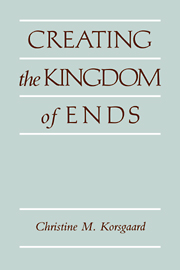Book contents
- Frontmatter
- Contents
- Introduction
- Abbreviations for Kant's works
- PART ONE KANT'S MORAL PHILOSOPHY
- 1 An introduction to the ethical, political, and religious thought of Kant
- 2 Kant's analysis of obligation: The argument of Groundwork I
- 3 Kant's Formula of Universal Law
- 4 Kant's Formula of Humanity
- 5 The right to lie: Kant on dealing with evil
- 6 Morality as freedom
- 7 Creating the Kingdom of Ends: Reciprocity and responsibility in personal relations
- PART TWO COMPARATIVE ESSAYS
- Bibliography
- Sources
- Other publications by the author
- Index
- Index of citations
1 - An introduction to the ethical, political, and religious thought of Kant
Published online by Cambridge University Press: 05 June 2012
- Frontmatter
- Contents
- Introduction
- Abbreviations for Kant's works
- PART ONE KANT'S MORAL PHILOSOPHY
- 1 An introduction to the ethical, political, and religious thought of Kant
- 2 Kant's analysis of obligation: The argument of Groundwork I
- 3 Kant's Formula of Universal Law
- 4 Kant's Formula of Humanity
- 5 The right to lie: Kant on dealing with evil
- 6 Morality as freedom
- 7 Creating the Kingdom of Ends: Reciprocity and responsibility in personal relations
- PART TWO COMPARATIVE ESSAYS
- Bibliography
- Sources
- Other publications by the author
- Index
- Index of citations
Summary
… reason has no dictatorial authority; its verdict is always simply the agreement of free citizens, of whom each one must be permitted to express, without let or hindrance, his objections or even his veto. (C1 A738–39/B766–67)
Critique of Pure ReasonFor Immanuel Kant the death of speculative metaphysics and the birth of the rights of man were not independent events. Together they constitute the resolution of the Enlightenment debate about the scope and power of reason. In the Critique of Pure Reason Kant shows that theoretical reason is unable to answer the questions of speculative metaphysics: whether God exists, the soul is immortal, and the will is free. But this conclusion prepares the way for an extension in the power of practical reason. Practical reason directs that every human being as a free and autonomous being must be regarded as unconditionally valuable. In his ethical writings Kant shows how this directive provides a rational foundation for morality, politics, and a religion of moral faith. Bringing reason to the world becomes the enterprise of morality rather than metaphysics, and the work as well as the hope of humanity.
A CHILD OF THE ENLIGHTENMENT
Immanuel Kant was born in Königsberg, Prussia, on 22 April 1724, into a devout Pietist family.
Information
- Type
- Chapter
- Information
- Creating the Kingdom of Ends , pp. 3 - 42Publisher: Cambridge University PressPrint publication year: 1996
Accessibility standard: Unknown
Why this information is here
This section outlines the accessibility features of this content - including support for screen readers, full keyboard navigation and high-contrast display options. This may not be relevant for you.Accessibility Information
- 6
- Cited by
